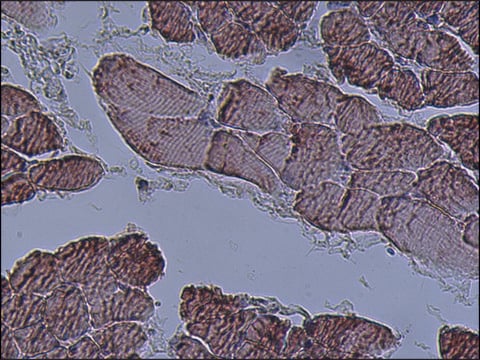SAB4200689
Anti-Actin (α-Sarcomeric) antibody, Mouse monoclonal
clone 5C5, hybridoma cell culture supernatant
Synonym(s):
Actin alpha sarcomeric/skeletal, a-SCA, alpha-SCA, alpha-sarcomeric actin
About This Item
Recommended Products
biological source
mouse
Quality Level
antibody form
purified immunoglobulin
antibody product type
primary antibodies
clone
5C5, monoclonal
form
buffered aqueous solution
mol wt
antigen ~42 kDa
species reactivity
rat, chicken, bovine, mouse, guinea pig, rabbit, human, planaria(flatworm), fish, Xenopus
packaging
antibody small pack of 25 μL
technique(s)
ELISA: suitable
immunoblotting: 1:500-1:1000 using rat heart tissue extracts
immunofluorescence: 1:500-1000 using human HeLa cells.
immunohistochemistry: 1:500 using formalin-fixed, paraffin-embedded human tongue sections and Biotin/ExtrAvidin®-Peroxidase staining system.
isotype
IgM
shipped in
dry ice
storage temp.
−20°C
target post-translational modification
unmodified
Gene Information
human ... ACTA2(59)
General description
Immunogen
Application
- indirect immunofluorescence staining
- immunohistochemistry
- enzyme-linked immunosorbent assay (ELISA)
- immunoblotting
- immunofluorescence
Biochem/physiol Actions
Physical form
Legal Information
Disclaimer
Not finding the right product?
Try our Product Selector Tool.
Storage Class Code
12 - Non Combustible Liquids
WGK
nwg
Flash Point(F)
Not applicable
Flash Point(C)
Not applicable
Certificates of Analysis (COA)
Search for Certificates of Analysis (COA) by entering the products Lot/Batch Number. Lot and Batch Numbers can be found on a product’s label following the words ‘Lot’ or ‘Batch’.
Already Own This Product?
Find documentation for the products that you have recently purchased in the Document Library.
Our team of scientists has experience in all areas of research including Life Science, Material Science, Chemical Synthesis, Chromatography, Analytical and many others.
Contact Technical Service








